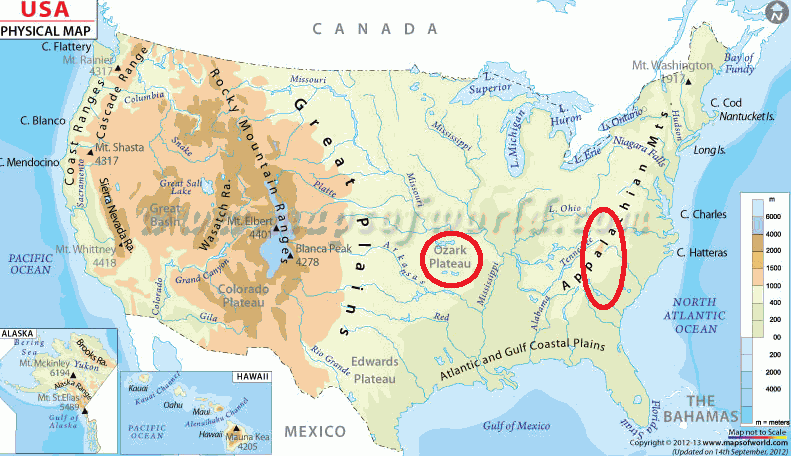「#1266. アメリカ英語に "colonial lag" はあるか (1)」 ([2012-10-14-1]),「#1267. アメリカ英語に "colonial lag" はあるか (2)」 ([2012-10-15-1]),「#1268. アメリカ英語に "colonial lag" はあるか (3)」 ([2012-10-16-1]) で,アメリカ英語が古い英語をよく保存しているという "colonial lag" の神話について議論した.アメリカでとりわけ人口に膾炙しているこの種の神話の1つに,標題のものがある.この神話ついては Montgomery が詳しく批評しており,いかに根強い神話であるかを次のように紹介している (66--67) .
The idea that in isolated places somewhere in the country people still use 'Elizabethan' or 'Shakespearean' speech is widely held, and it is probably one of the hardier cultural beliefs or myths in the collective American psyche. Yet it lacks a definitive version and is often expressed in vague geographical and chronological terms. Since its beginning in the late nineteenth century the idea has most often been associated with the southern mountains --- the Appalachians of North Carolina, Tennessee, Kentucky and West Virginia, and the Ozarks of Arkansas and Missouri. At one extreme it reflects nothing less than a relatively young nation's desire for an account of its origins, while at the other extreme the incidental fact that English colonization of North America began during the reign of Queen Elizabeth I four centuries ago. Two things in particular account for its continued vitality: its romanticism and its political usefulness. Its linguistic validity is another matter. Linguists haven't substantiated it, nor have they tried, since the claim of Elizabethan English is based on such little evidence. But this is a secondary, if not irrelevant, consideration for those who have articulated it in print --- popular writers and the occasional academic --- for over a century. It has indisputably achieved the status of a myth in the sense of a powerful cultural belief.
神話なので,問題となっている南部山地が具体的にどこを指すのかは曖昧だが,Appalachia や the Ozarks 辺りが候補らしい.

では,その英語変種の何をもってエリザベス朝の英語といわれるのか.しばしば引用されるのは,動詞の強変化活用形 (ex. clum (climbed), drug (dragged), fotch (fetched), holp (help)) ,-st で終わる単音節名詞の複数語尾としての -es (ex. postes, beastes, nestes, ghostes) などだが,これらは他の英米の変種にも見られる特徴であり,アパラチア山中に特有のものではない (Montgomery 68) .この議論には,言語学的にさほどの根拠はないのである.
引用内に述べられているとおり,神話が生まれた背景には,古きよきイングランドへのロマンと政治的有用性とがあった.だが,前者のロマンは理解しやすいとしても,後者の政治的有用性とは何のことだろうか.Montgomery (75) によると,南部山間部に暮らす人々に対して貼りつけられた「貧しく無教養な田舎者」という負のレッテルを払拭するために,彼らの話す英語は「古きよき英語」であるという神話が創出されたのだという.
Advancing the idea, improbable as it is, that mountain people speak like Shakespeare counters the prevailing ideology of the classroom and society at large that unfairly handicaps rural mountain people as uneducated and unpolished and that considers their language to be a corruption of proper English.
「時代後れの野暮ったい」変種が,この神話によって「古きよき時代の素朴な」変種として生まれ変わったということになる.社会言語学的な価値の見事な逆転劇である.負の価値が正の価値へ逆転したのだから,これ自体は悪いことではないと言えるのかもしれない.しかし,政治的な意図により負から正へ逆転したということは,同じ意図により正から負への逆転もあり得るということを示唆しており,言葉にまつわる神話というものの怖さと強さが感じられる例ではないだろうか.
・ Montgomery, Michael. "In the Appalachians They Speak like Shakespeare." Language Myths. Ed. Laurie Bauer and Peter Trudgill. London: Penguin, 1998. 66--76.